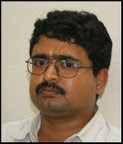Paulo Coelho on 'Progresive Writers'
(from the preface of 'Like the Flowing River')
a) A writer always wears glasses and never combs his hair. KAlf the
time he feels angry about everything and the other half he depressed.
He spends most of his life in bars, arguing with other dishevelled,
bespectacled writers. He says very 'deep' things. He always has
amazing ideas for the plot of his next novel, and hates the one he has
just published.
b) A writer has a duty and an obligation never to be understood by his
own generation ; convinced, as he is. that he has been born into an
age of mediocrity, he belives that being understood would mean loosing
his chance of ever being considered a genius. A writer revises and
rewrites eacj sentance many times. The voabulary if the average man is
made up of 3,000 words ; a real writer never uses any of these,
because there are another 1,89.000 in the dictonary, and he is not the
average man.
c) Only other writers can understand what a writer is trying to say.
Even so, he secretly hates all other wirters, because they are alwyas
jockeying for the same vacancies left by the history of literature
over the centuries. And so the writer and his peers compete for the
'most complicated book' : the one who wins will be the one who has
succeeded in being the most difficult to read.
d) A writer understands about things with alarming names, like
seminotics, epistomology, neoconcretism. When he wants to shock
someone, he says things like : 'Einstein is a fool', or 'Tostoy was
the clown of the bourgeoisie'. Everyone is scandalised, but they
neverthless go and tell other people that the theory of relativity is
bunk, and that Tolstoy was a defender of the Russian aristocracy.
e)When trying to seduce women, a writer says : 'I'm a writer', and
scribbles a poem on a napkin. It always works.
f) Given his vast culture, a writer can always get work as a literary
critic. In that role, he can show generosity by writing about his
freinds' books. Half of any such reviews are made up of quotations
from foreign authors and other half of analysis of sentances, alwyas
using expressions such as 'the epistemological cut', or 'an integrated
bi-dimensional vision of life'. Anyone reading the reviews will say
:'What a cultivated person', but he won't buy the book because he will
be afraid he might not know how to continue reading when the
epistemological cut appears.
g)When invited to say what he is reading at the moment, a writer
always mentions a book no one has ever heard of.
h)There is oonly one book that arouses the unanimous admiration of the
writer and his peers : Ulysess by James Joyce. No writer will ever
speak ill of this book, but when someone asks him about what it is all
about, he can't quite explain, making one doubt that he has actually
read it.
From the preface of 'Like the Flowing River'
